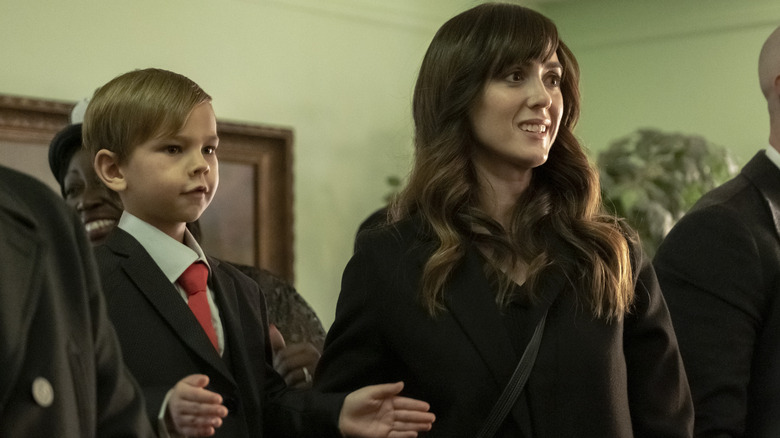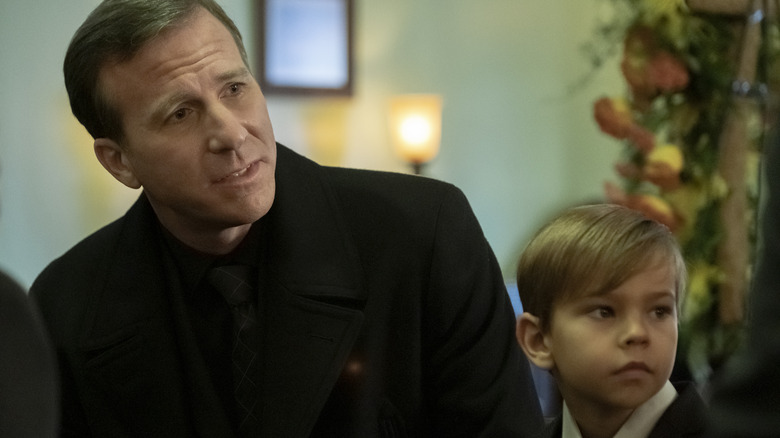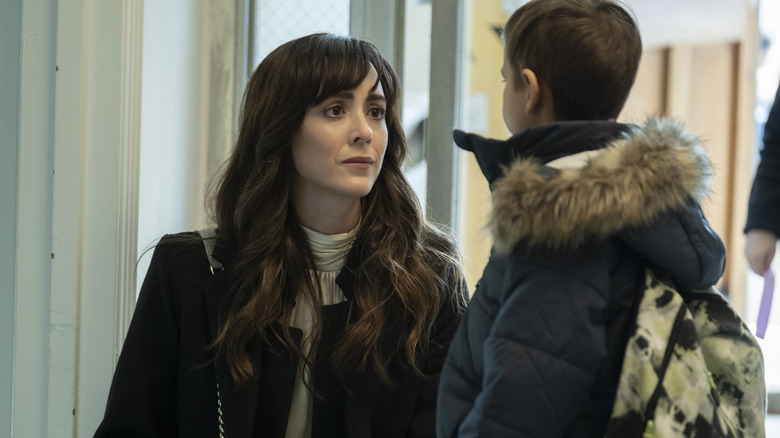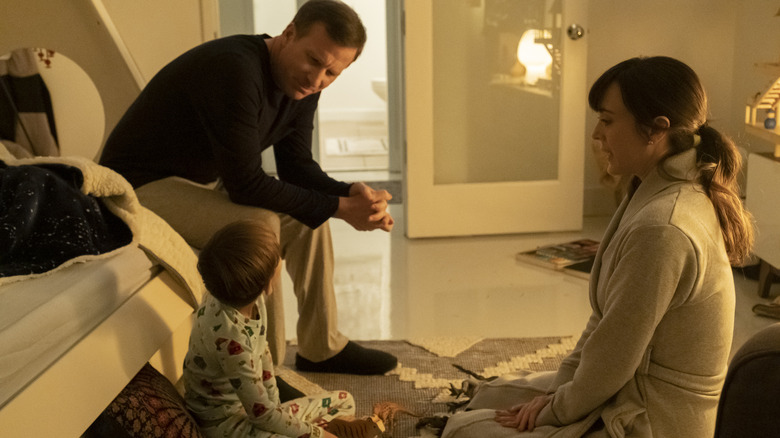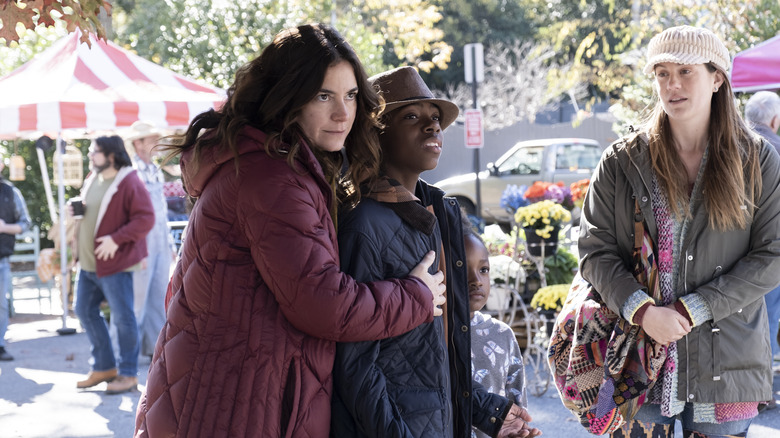Atlanta Season 3 Episode 7 Gives Us Another Standalone Story With 'Trini 2 De Bone'
This episode of "Atlanta" is a portrait of the way wealthy white elites depend on the physical and emotional labor of Black/POC caregivers to raise their children. It's a tale as old as time, dating back to the days when Black enslaved women were depended upon to raise the children of white slave owners, forced to breastfeed little white babies even as their own children were starved or ripped away from them and sold like animals. In the case of "Trini 2 de Bone," this story plays out with a modern family of four, consisting of a white mother, white father, their young white son, and the recently deceased Black Caribbean nanny who had been raising him.
Kids don't want eggs benedict, you weirdos
From the start of the episode, it's obvious these people haven't been actively raising their own kid, and that the kid is being raised by a woman of color who makes a mean spicy curried mango sauce. Most kids — not even my own bougie, sushi-gobbling daughter — wouldn't wanna eat eggs benedict, so I know the mom in this family has never actually prepared a meal for her own kid or dealt with him on an intimate level. She seems confused and uninterested in actually engaging with her own child, and dad isn't much better. They can't figure out where the nanny, Sylvia, is, and it turns out that she's dead. Now they have to actually raise their own child — or find someone else to pick up where Sylvia left off.
Initially, mom is reluctant to tell Sebastian that his beloved nanny has passed away, and it's becoming increasingly obvious that he had a closer, more traditional parent-child relationship with her than with his own mother. There's an interesting moment of role reversal in which Sebastian acts as more of a caregiver to his mom by initiating an anti-anxiety technique for her. Eventually, Mom and Dad do tell little Sebastian that the woman who introduced him to the magic of curry is dead.
In light of this, Dad considers attending Sylvia's funeral, while Mom is eager to wash her hands of Sylvia and move on. God forbid she mourn the help or fully acknowledge how much this woman meant to her son. Mom's obvious discomfort with her son picking up what it seems she clearly considers "undesirable" foreign cultural habits lead her to suggest that they hire a "more metropolitan" nanny, which dad says would be much more expensive than hiring some nice colored lady from the Caribbean like that did with Sylvia. Mom counters by suggesting they could hire a Chinese nanny, that way Sebastian can learn Mandarin. It's fascinating how they discuss the value of these women in terms of how much they can exploit their labor, trying to get more bang for their buck in the form of siphoning whatever looks good on a private school application or job resume from their respective cultures.
Eventually, they decide to attend the funeral thanks to Dad's relentless pursuit of "teachable moments," which include treating Black people as a fascinating cultural exhibit and making sure his son sees a dead person up close. To be fair, I totally understand his desire to dispel the taboo surrounding death, but it should go without saying that I'm not exactly on board with his approach to intercultural relations.
Dance at a funeral
After several awkward socio-cultural interactions — including an indication that they aren't exactly welcome there with Sebastian saying, "Cockroach have no right in fowl party" and one of Sylvia's family members laughing and agreeing — Sebastian and his parents are all at Sylvia's funeral. They're some of the only white people there, in addition to this other white guy named Devon, who has a strong Caribbean accent. Before there's even enough time to wonder if his character was inspired by Chet Hanks — son of actor Tom Hanks — Devon reveals that Sylvia was also his babysitter once upon a time.
After this introduction, Sylvia's life and accomplishments are praised and celebrated by her family and friends. She was a dancer, she helped get her family to America, she has a famous, football-playing nephew, and she cared deeply for others. A dance tribute is performed in her honor, but it is interrupted by one of Sylvia's daughters, who takes the stage to passionately speak about the way her mother was not around when she needed her, because she was taking care of rich white people's kids instead of nurturing her own. Chaos breaks out, and Sebastian and his parents attempt to leave amid the calamity, only to be called out by one of the funeral attendees who tells them not to be afraid, and that this is just how they show grief and sadness.
At the end of the episode, Sebastian goes into his room and says goodnight to Sylvia, implying that she is there in spirit form. Meanwhile, Dad answers a loud knock at the door and receives an envelope full of pictures from the school's family picture day, featuring Sylvia and Sebastian happily posing as mother and child.
So about the ending...
Assuming her spirit was actually there in Sebastian's room, I have to wonder what the message is if Sylvia's ghost would still choose to return to care for this little white boy even after the outpouring of grief at the funeral from her own daughter who felt neglected in favor of the white children in Sylvia's care. Why wouldn't she just move on and enjoy her afterlife or pay ghostly visits to her own family? I don't know the rules of the afterworld, and I don't know the particulars of how ghosts and supernatural entities function in "Atlanta," but it's not a good look, you know?
The reason why I'm inclined to believe that her spirit was there is that Sebastian insisted on his mother being in the room with him earlier in the episode, stating that Sylvia always used to stay with him, patting his back and singing to him until he fell asleep. By the end of the episode, he doesn't ask for his mom to stay in the room, and then makes a point to say goodnight to Sylvia. Given the fact that ghosts and the supernatural are a recurring theme on the show, it's not a stretch to assume that her ghost is actually present, and that bugs me for one major reason.
In the piece about the history of Black wet nurses and caregivers that I linked earlier in this review, the author mentions that the false stereotype of the "Bad Black Mother" who loves the white children in her care more than her own Black children was used as an excuse to justify the exploitation of their labor and bodies. This excerpt from the article sums it up quite well,
"The widespread stereotype of a 'Bad Black Mother' justified this practice. It propagated the idea of a mythical Mammy who loved the white children and took them under her care while she cold-heartedly disregarded her own.
The Mammy was also portrayed as a cruel mother who deserted her own children and family for the service of her owners to enjoy the comfort of house labor which was often not available for slaves."
Because of the way the episode ends, it seems as though the show is at least partially reinforcing this narrative rather than critiquing it, which is troubling and yet another example of the show's questionable depictions of Black women and Black motherhood that I've already mentioned several times over throughout my reviews. To be clear, I don't expect any piece of art or media to only portray Black women (or anyone else) as paragons of moral righteousness and perfection; in fact, I find perfect characters boring and unrealistic. The issue lies in the fact that "Atlanta" seems particularly concerned with pushing negative, stereotypical, one-dimensional caricatures of Black women, and it makes the show hard to watch at times. In the case of Sylvia, she clearly cared for her family and had a life outside of being a caregiver, but she's also dead before we get to see any of that. It's all just frustrating because I want to enjoy the show, but it's difficult to do that given the circumstances.
Who is Atlanta even for?
I'll be frank — I really don't know who this show is for anymore. It's not that I don't get it; it's that I do get it and much of it is so predictable and obvious that I have to wonder if I'm just particularly keen and in tune with the social commentary being made, or if others feel the same. Is this show for white people? What is it trying to say, and who is the message for? It's not that there isn't room for various perspectives and interpretations of the same topics regarding the often messy and complex intersections of race, class, and culture. It's just that I don't think "Atlanta” is always as effective or impactful as it probably intends to be when it comes to cultural commentary. Part of this probably lies in the way the phantom of internalized anti-Blackness that continues to haunt the show's creator, because I really don't think we can get fully realized and nuanced takes on race from someone who is strangely unwilling to fully interrogate their own bias and relationship with their blackness and identity. Sure, Glover isn't sitting down and writing every episode himself — there's a whole team of writers, but it's ultimately still his show with his fingerprints all over it, for better or worse.
With these standalone episodes, it feels as though "Atlanta" is aiming to rival or compete with someone like Jordan Peele — and falling short of doing so in any meaningful way. Sure, the end result is amusing, but is it really thought-provoking? Maybe to people who don't normally think about or live with the reality of these things, but I can't imagine that type of person would be tuning in for "Atlanta" to begin with. It doesn't even feel quite like commentary so much as disappointingly hollow satire, or maybe a funhouse mirror of sorts. I can't tell if the show thinks it's smarter than it actually is, or if I had too much faith in it and have unintentionally orchestrated my own disappointment. Whatever the case may be, there are now three episodes left in this uneven season of hits and misses. As I mentioned in my review of "White Fashion," I'm hoping things all come together in a grand, satisfying way by the end of it all.
